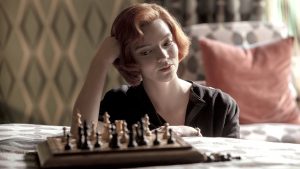There have been exactly four good movies about chess players: “Searching For Bobby Fischer,” “Queen Of Katwe” (which I reviewed here), “Brooklyn Castle” (my review is here), and “Pawn Sacrifice.” But now, “The Queen’s Gambit” must be added to that list, even though it’s a seven-part limited series on Netflix, rather than a feature-length movie.
“The Queen’s Gambit” is the story of Beth Harmon, who learns how to play chess from the janitor at the Kentucky orphanage she’s placed in after her mother dies in a car wreck. But that’s not the only thing Beth learns there. She and the other young women are dosed daily with tranquilizers to keep them sedated enough for the oppressive staff to manage. Thus, Beth develops an addiction to the pills, particularly after she discovers they allow her to hallucinate chess boards and pieces and strategies on the ceiling.
Beth is eventually adopted by a couple, Alma and Allston Wheatley. It’s apparent right away that he has no interest in being a father, and only slightly more in being a husband, particularly with a wife who seems medicated or inebriated most of the time. This makes for an unpleasant home life for Beth, but she spends her time reading chess books and magazines to learn more about the game. She gets so good that, at age 9, she takes on the entire high school chess team in simultaneous games.
As Beth grows, her chess game gets better and better, as does her relationship with Alma. But like her adoptive mother, she becomes reliant on pills and booze to survive from one tournament to the next. Along the way, she develops friendships and relationships with highly talented male players, and sets her sights on one day competing against the Soviets, considered the best in the world.
While Annabeth Kelly and Isla Johnston play the younger Beth, the role really belongs to Anya Taylor-Joy, who plays her from the teen years through her early twenties. Taylor-Joy is a marvelously expressive actress with big eyes and exactly the right intensity for the role. Marielle Heller, who directed the filmed version of Heidi Schreck’s “What The Constitution Means To Me” (which I reviewed here), plays Alma as a woman struggling to find a purpose in life. The ever-solid Bill Camp plays Mr. Shaibel, Beth’s first chess tutor. Moses Ingram shines as Jolene, who befriends and encourages Beth from her first day at the orphanage.
As for the chess scenes, they look right because of the two advisers writer/director Frank brought in to oversee them. One is Bruce Pandolfini, a well-known chess coach who was played by Ben Kingsley in “Searching For Bobby Fischer.” The other is former grandmaster and world champion Garry Kasparov, who spent more than 20 years as the top-ranked player in the world. With their help, Taylor-Joy and other cast members learned how to move the pieces — sometimes very quickly during speed-chess games — and give a feeling of authenticity to every match they play.
I learned how to play chess from my father, who coached his high school’s team in the 1970s, and still consider the first time I beat him to be one of the highlights of my life. Although I haven’t played in many, many years, I still recognize the names of some of the strategies Beth learns about, including the Ruy Lopez, the Sicilian Defense, and the sequence the series is named for.
But even if you know nothing about chess, you’ll enjoy “The Queen’s Gambit” as the account of a strong-willed young woman able to set aside her troubled life whenever it came to concentrating on an eight-by-eight chessboard. Like Matt Damon’s character in “Good Will Hunting” facing a math problem, you get the sense that Beth’s brain is working at a different level, thinking and planning many more moves ahead than anyone else. Chess is the only thing in her life that makes sense.
“The Queen’s Gambit” works as a sports movie, a coming-of-age story, and a mother-daughter bonding experience. Plus, the costumes, set design, and production design are all as beautiful as the way Beth out-plays an opponent until he knocks over his own king to acknowledge defeat.
Now streaming on Netflix, I rate it a 9 out of 10.

